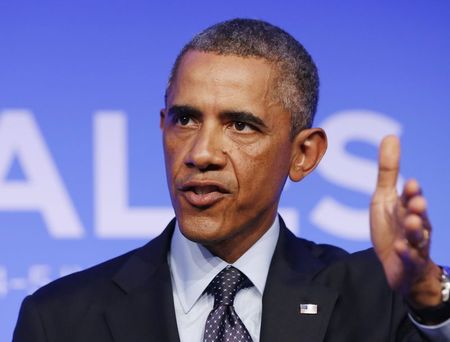By Roberta Rampton and Doina Chiacu
WASHINGTON (Reuters) - U.S. President Barack Obama reversed course on Saturday and delayed taking executive action on immigration reform until after November congressional elections, bowing to concerns it could cost his fellow Democrats control of the U.S. Senate.
Obama had promised in a high-profile White House appearance in June to announce unilateral measures by the end of summer if Congress did not enact immigration reform legislation.
But Obama said the surge of nearly 63,000 children from Central America crossing the border to the United States in the past year had made Americans wary of new immigration measures.
"The truth of the matter is that the politics did shift midsummer because of that problem," Obama said in an interview with NBC's "Meet the Press" set to air on Sunday.
Obama said he plans to act later this year after making more of a public case for his actions, which are expected to remove the threat of deportation for some of the 11 million undocumented immigrants living in the United States.
A White House official cited partisan politics as the main reason for the delay, saying taking action before the election would harm long-term prospects for reforming immigration laws.
"The reality the president has had to weigh is that we're in the midst of the political season," the official said, speaking on condition of anonymity.
Immigration reform advocates called the delay a betrayal and accused Obama of putting politics first.
"Today the president and the Senate Democrats have made it very clear that undocumented immigrants and Latinos are simply viewed as political pawns," said Eddie Carmona, campaign manager for the PICO immigration reform group.
Senate Republican leader Mitch McConnell, who is in a tight midterm race himself, called the decision cynical.
"He's just saying he'll go around the law once it's too late for Americans to hold his party accountable in the November elections," the Kentucky senator said in a statement.
Republicans, who already control the House of Representatives, have seized on immigration to attack vulnerable Democratic senators.
Republicans blamed the flood of migrant children coming across the border on Obama's 2012 decision to grant temporary legal status to some undocumented immigrants who were brought to the United States as children.
They have called for rolling back that policy. Hispanic groups, on the other hand, have pressed the president to expand the 2012 policy to millions of family members of those children.
In New Hampshire, the issue has helped Republican Scott Brown erode the lead in opinion polls of Democratic Senator Jeanne Shaheen, upending White House calculations that immigration would not play a major role in the elections.
Other Democratic candidates in tough Senate races asked the White House to delay. Republicans need six seats to gain control of the chamber - a win that would badly undermine Obama for the remainder of his second term.
'SUCKER-PUNCHED'
Obama was circumspect about the timing of his announcement on executive action when asked about it a week ago during a news conference, and advocates could see the writing on the wall.
"But I think overall the feeling is going to be they've been sucker-punched, because the timetable for the end of the summer had been really clear," said Angela Kelley, an immigration policy expert at the Center for American Progress, a group that is close to the White House.
Advocacy group America's Voice expressed bitter disappointment and blamed Obama and Senate Democrats.
"We advocates didn't make the reform promise; we just made the mistake of believing it," the group's executive director, Frank Sharry, said in a statement.
Among the reforms Obama is considering are granting work permits and temporary relief from deportation to as many as 5 million undocumented immigrants. Obama said on Friday his plan would also include more enforcement against illegal immigration and steps to encourage legal immigration.
Obama and Democrats could be hurt if Latino voters, an important base of support, stay home and do not vote in close midterm races where every vote will count.
But the alternative would have hurt them more, said David Yepsen, director of the Paul Simon Public Policy Institute at Southern Illinois University.
"What polls were indicating was, it would be unpopular," Yepsen said in an interview. "Politically, he's better off not doing it until after the election, and taking the flack for looking like he changed his mind."
A Reuters/Ipsos poll last month showed 70 percent of Americans believe undocumented immigrants threaten the country's culture and economy.
Democratic Senator Mark Udall of Colorado, where the president's decision could hurt him among the state's sizable Hispanic community, said he was disappointed Obama "delayed action to keep families together" but blamed the move on House Republicans who blocked comprehensive immigration reform.
Obama will need to rebuild confidence with immigrant communities, some advocates said, and the delay may put pressure on him to embrace bolder reforms after November.

Kevin Appleby, director of the U.S. Conference of Catholic Bishops, said earlier in the week that if he delayed action: "The pressure on Obama to go big will be even higher. I would rather see him go big in November than small in September."
(Additional reporting by Julia Edwards; Writing by Doina Chiacu; Editing by Frances Kerry, Sonya Hepinstall, Stephen Powell, Mohammad Zargham and Lisa Shumaker)
